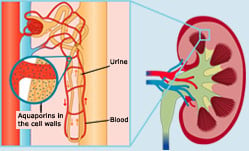The Nobel Prize in Chemistry 2003
|
| The Nobel Prize in Chemistry 2003 | |||||||||||||||||||||||||||
|
||||||||||||||||||||||||||||
|
Nobel Prizes and laureates
Six prizes were awarded for achievements that have conferred the greatest benefit to humankind. The 12 laureates' work and discoveries range from proteins' structures and machine learning to fighting for a world free of nuclear weapons.
See them all presented here.



